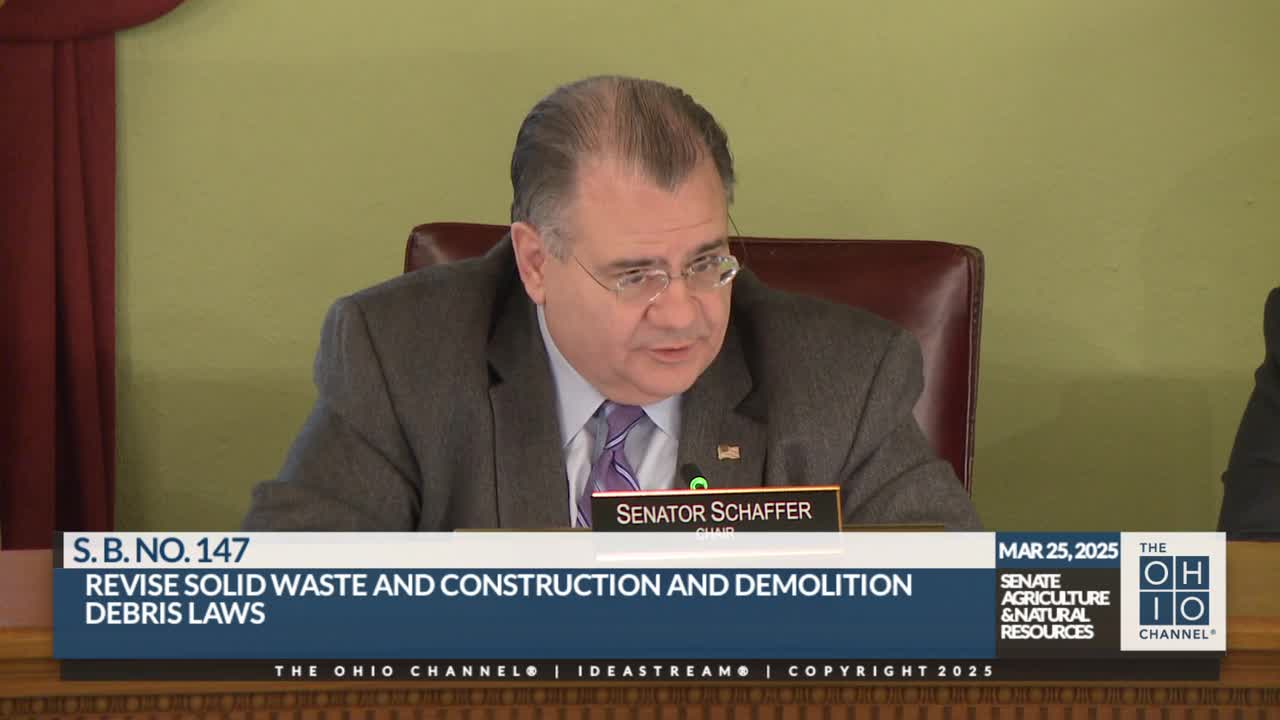Senate hears bill to let counties withdraw from multi-county solid-waste districts; Seneca County officials push support

Summary
Senate Bill 147 would allow counties to begin a withdrawal process from multi-county solid waste districts. Seneca County Commissioner Anthony Paradiso and Seneca County Health Commissioner Julie Richards testified that the change would give local officials more control and funds to oversee a large landfill expanding in Seneca County.
The Senate Agriculture and Natural Resources Committee held a second hearing Wednesday on Senate Bill 147, a measure that would let a county begin a formal withdrawal process from a multi-county solid waste management district. Anthony Paradiso, a Seneca County commissioner, and Julie Richards, Seneca County health commissioner, testified in favor of the bill.
Paradiso told the committee Seneca County is part of the Ottawa-Sandusky-Seneca Solid Waste Management District (OSS), whose governing board includes three county commissioners from each county (nine voting members). He said the Wind Waste landfill serving the district brings in the bulk of waste revenue and that Seneca County receives a disproportionate share of impacts while seeking more local resources for oversight. "We are asking you to do the same here. Give authority to local counties to write their own destiny," Paradiso said.
Paradiso told senators the landfill in Sandusky County accepts a large share of out-of-state waste and that Seneca County now provides about 94% of OSS's revenue while Ottawa County supplies roughly 6% (as described in his testimony). He said that on Sept. 9, 2024, a permit was approved to expand the landfill by more than 43 percent and that the Seneca County Board of Commissioners passed a resolution on Nov. 14, 2024, seeking withdrawal from the district; the other two counties voted to deny that withdrawal, he said.
Julie Richards described how the Seneca County General Health District has created a landfill division to inspect and regulate the Wind Waste landfill and said the agency faces staffing and funding challenges. "Currently we receive 40 cents per ton of waste," Richards said, and she said her office recently hired a sanitarian in training to assist inspections. Richards told the committee the county has responded to multiple recent incidents, including two leachate events in the preceding 30 days — one she described as involving 53,000 tons of leachate — and a train derailment that generated approximately 200 cubic feet of contaminated soil now bound for the landfill.
Richards said OSS has declined to fully fund the county's landfill inspector salary and that attempts to secure reimbursement for consultant fees have been met with resistance. She said the county sought out-of-state landfill consultants to avoid potential conflict-of-interest issues with local consultants who have worked with Wind Waste in the past. "By separating or having the ability to separate from OSS, Seneca County will be able to obtain the necessary funds in a more efficient manner to conduct inspections, provide emergency response to hazardous situations in the community, and purchase the necessary equipment to protect our staff and our community," Richards said.
Senator Manchester asked what Seneca County’s potential withdrawal would mean for Sandusky County, which does not have its own landfill. Paradiso replied that passage of SB 147 would allow Seneca County to study options over a 24-month period, including discussions with neighboring counties and possible new district arrangements; he said it would not automatically cause Seneca to leave. Ranking Member Hicks Hudson asked whether the withdrawal would require a voter referendum; Paradiso said SB 147, as discussed in the hearing, would allow the county commissioners to accomplish the withdrawal without a public referendum and would follow a 24-month process aligned with EPA recommendations, as described in his testimony.
No committee vote was taken during the hearing. Seneca County submitted written proponent testimony from Mayor Donald Minnell of Fostoria, which the chair acknowledged in the hearing record.

